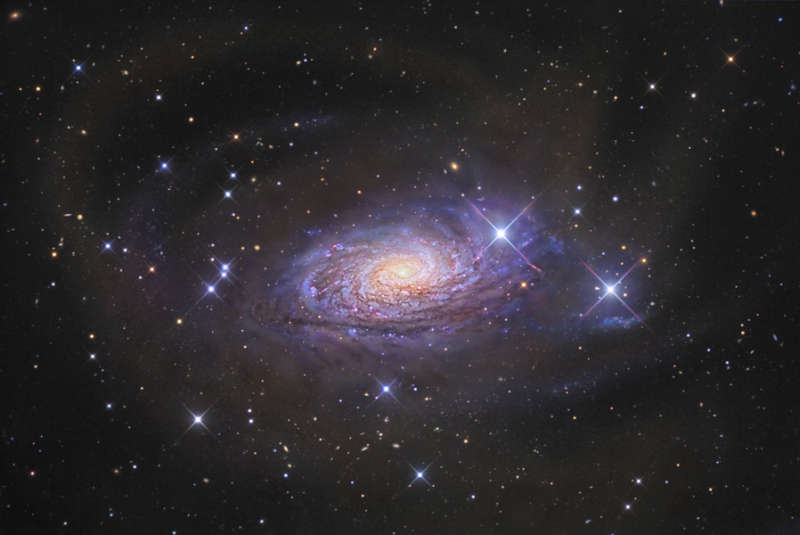
|
Credit & Copyright: T.S. Chonis
(U. Texas),
D. Martinez-Delgado (MPIA, IAC), Ray Gralak (New Mexico Skies), Gary J. Hill (McDonald Obs), I. Trujillo (IAC), S. R. Majewski (U. Virginia)
Explanation:
A bright spiral galaxy of the northern sky,
Messier 63
is about 25 million light-years distant in the
loyal constellation
Canes
Venatici.
Also cataloged as NGC 5055, the majestic
island universe
is nearly 100,000 light-years across, about the size
of our own Milky Way.
Known by the popular moniker, The Sunflower Galaxy,
M63 sports a bright yellowish core and sweeping blue spiral arms,
streaked with cosmic dust lanes and
dotted with pink star forming regions.
This
deep exposure also reveals an enormous but dim
arc extending far into the halo above the brighter galactic plane.
A collaboration of professional and amateur astronomers has shown
the arc to be consistent with the stellar stream from a smaller
satellite galaxy, tidally disrupted as it
merged with M63 during the last 5 billion years.
Their discovery is part of an increasing
body of evidence that the
growth of large spirals by cannibalizing smaller galaxies is
commonplace in the
nearby Universe.
D. Martinez-Delgado (MPIA, IAC), Ray Gralak (New Mexico Skies), Gary J. Hill (McDonald Obs), I. Trujillo (IAC), S. R. Majewski (U. Virginia)
Take a short
survey about viewing astronomy images on mobile devices.
|
January February March April May June July August September October November December |
| ||||||||||||||||||||||||||||||||||||||||||||||||
NASA Web Site Statements, Warnings, and Disclaimers
NASA Official: Jay Norris. Specific rights apply.
A service of: LHEA at NASA / GSFC
& Michigan Tech. U.
Based on Astronomy Picture
Of the Day
Publications with keywords: M 63 - spiral galaxy
Publications with words: M 63 - spiral galaxy
See also:
- Portrait of NGC 1055
- APOD: 2025 September 4 Á NGC 4565: Galaxy on Edge
- APOD: 2025 August 22 Á A Tale of Two Nebulae
- APOD: 2025 August 19 Á Giant Galaxies in Pavo
- APOD: 2025 August 18 Á NGC 1309: A Useful Spiral Galaxy
- APOD: 2025 July 4 Á NGC 6946 and NGC 6939
- APOD: 2025 June 30 Á NGC 4651: The Umbrella Galaxy
